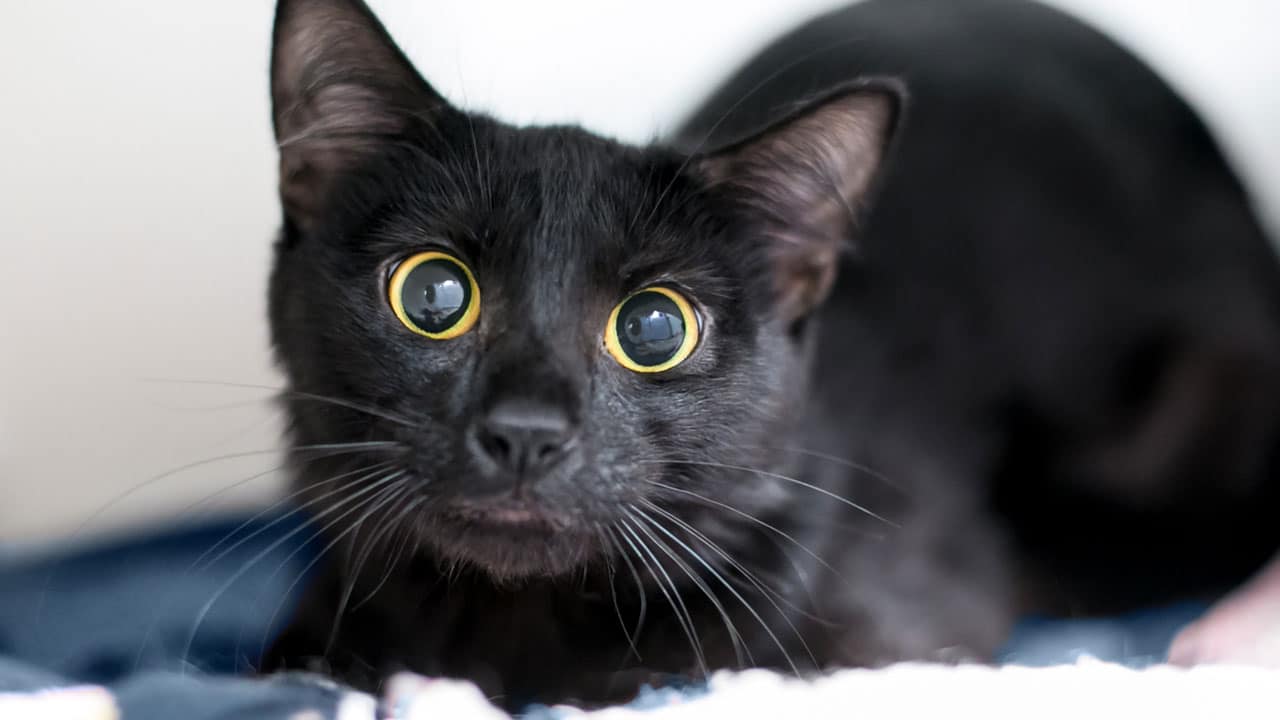Cats, like humans, can experience anxiety that affects their well-being, which is why identifying cat anxiety symptoms is crucial in providing them with the necessary support. Understanding how to help a cat with anxiety and implementing effective strategies can significantly impact their overall happiness and quality of life.
What causes cat anxiety?
Anxiety in cats can be caused by various factors, including changes in their environment, past traumatic experiences, lack of socialisation or medical conditions. Common triggers include loud noises, new surroundings, separation from their owner and conflicts with other animals. Being able to identify these causes can help us address and manage feline anxiety effectively.
Cat anxiety symptoms
Cat anxiety is a common issue many feline owners encounter. Spotting the signs of a stressed cat allows us to intervene early and address their anxiety.
Here are some common symptoms to look out for:
- Excessive grooming — Cats may excessively groom themselves as a coping mechanism to alleviate stress. They may lick or chew their fur excessively, leading to bald patches or skin irritations.
- Aggression — Anxiety can cause cats to become more aggressive. They may hiss, scratch or bite when threatened or overwhelmed by their environment or certain stimuli.
- Hiding — Stressed cats often seek refuge in hiding spots. They may retreat to secluded areas of the house, such as under furniture or in closets, to feel safe and secure.
- Excessive vocalisation — Anxious cats may exhibit increased vocalisation, including meowing, yowling or howling. They may use vocalisation to express their distress or seek attention.
- Changes in appetite — Cat anxiety can lead to changes in eating habits. Some cats may experience a decrease in appetite, while others may exhibit stress-related overeating or compulsive eating behaviours.
- Inappropriate elimination — Anxiety can cause cats to have litter box issues. They may start urinating or defecating outside the litter box as a response to stress.
- Restlessness — Stressed cats may exhibit restlessness by pacing or by being unable to settle down. They may constantly move around or appear on edge.
By recognising the signs of a stressed cat, we can take the necessary steps to alleviate their anxiety and create a more calming environment. Seeking professional advice from a veterinarian or animal behaviourist can provide further guidance on cat anxiety treatment and behaviour modification techniques.
Reducing cat anxiety
If your cat is feeling out of sorts, it’s critical that you know how to help reduce their anxiety. Here’s what you can do to help your cat feel more secure, relaxed and content in their surroundings:
- Create a calm environment — Provide a safe, quiet space for your cat, away from noise and disruptions. Set up hiding spots and vertical spaces where they can retreat and feel secure.
- Establish a consistent routine — Cats thrive on stability and predictability, so establishing a regular schedule for feeding, playtime and social interaction can help create a sense of security. Stick to consistent meal times and provide interactive play sessions to engage their natural instincts and provide mental stimulation. Consistency in their daily routine can help reduce anxiety and provide a comforting environment for your cat.
- Make time for enrichment activities — Engage your cat in mentally stimulating activities, such as interactive toys, puzzle feeders and scratching posts, to redirect their focus and alleviate anxiety.
- Look into pheromone therapy — Synthetic pheromone diffusers or sprays are available that mimic the calming scents naturally produced by cats. These pheromones can create a soothing environment and help alleviate anxiety-related behaviours. They are often used in situations like moving to a new home, introducing a new pet or other stressful events. Pheromone therapy is non-invasive and can be a useful addition to a comprehensive approach to managing cat anxiety.
- Provide positive reinforcement — Reward desired behaviours and provide gentle reassurance to help your cat associate positive experiences with situations that typically trigger anxiety.
- Ensure a balanced diet — Providing cats with a nutritionally complete and balanced diet supports their overall health and well-being, which can help reduce anxiety levels. Essential nutrients like omega-3 fatty acids, antioxidants and vitamins are known to affect mood and stress regulation positively. Opting for products like MfM Australia’s high-quality, hypoallergenic cat food that meets their dietary needs can contribute to a healthier, calmer disposition and potentially soothe anxiety symptoms.
- Seek veterinary consultation — Consult with your veterinarian to discuss potential medication or natural remedies that may aid in managing your cat’s anxiety.
By being familiar with cat anxiety symptoms and implementing effective strategies, we can help our feline companions live happier and more relaxed lives.
Remember that each cat is unique, and finding the right combination of techniques to alleviate their anxiety may take time. However, we can make a significant difference in our cat’s well-being with patience, love and the proper support.
Discover a balanced approach to cat care with MfM Australia’s premium cat food
At MfM Australia, we are committed to providing the highest quality products for your beloved pets. Our in-house nutrition and food science team has 40 years of experience, ensuring that our hypoallergenic, all-natural holistic diets are specifically formulated to support your cat’s health and well-being.
Explore our range of sustainably sourced and rigorously tested cat food, kitten food and pet supplements to provide your feline companion with the nutrition they deserve. Help them thrive and experience the benefits of MfM Australia’s premium cat food.
Not sure which product is right for your cat? Contact us today — we’re happy to assist!


